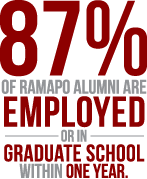College Catalog: 2011-2012
School of Social Science and Human Services (SSHS): African American Studies
School of Social Science and Human Services Website
Co-Conveners:
- Karl E. Johnson
- David Lewis-Colman
Faculty:
- Erin Augis
- Peter A. Campbell (CA)
- Regina Clark (CA)
- Rosina D’Angelo (AIS)
- Niza Fabre (AIS)
- George Gonpu (ASB)
- Sandra Gonsalves-Domond
Faculty:
- Peter D. Heinze
- Joseph Johnson (AIS)
- Mitchell Kahn
- John Peffer (CA)
- Andre Perry (CA)
- Paul Reck
- Tilahun Sineshaw
The Africana Studies Major prepares students to become informed and positive participants in the world community by developing a global perspective on Africa and its Diaspora. Building on Ramapo College’s heritage of interdisciplinary inquiry and discourse that has lead to innovations in teaching and student learning, the Program strives to imbue students with an analysis about Africa and its Diaspora far beyond that of a foundational knowledge base. Thus, our goals are to give our students an affirmative, transformative experience through learning about Africa’s people and Diasporic contributions to world culture with their arts, labor, resources, and civil and human rights ideologies. We embrace this new challenge to prepare our students to meet the current challenges of the 21st Century that Africa faces because it is central to the geocentric quest for peace and harmony throughout the world.
To accomplish these goals we rely on an extraordinary diverse faculty that are experts in a number of disciplines throughout all of our various Schools at Ramapo College. Our faculty is united in the belief of preparing our students to be global citizens in our technologically advancing world in the 21st century. Furthermore, the Faculty believes that this must be done by developing our students’ critical thinking skills, oral competence, writing ability, technological and ecological literacy in order to facilitate positive change on behalf of the African Diaspora and humanity.
What can you do with a B.A. in Africana Studies Degree? Jobs, Business Opportunities, Graduate School:
This region in particular provides current job opportunities and an immense future growth of opportunities for an Africana Studies major because it’s near New York City, which is a global and international hub. An Africana studies major can get a job in the emerging global financial business industry, with International Relief Agencies, with Federal or State Diplomatic services, with the Central Intelligence Agency, with United Nation agencies, with religious Foreign Missions, in International education. Also, they will get jobs in the traditional jobs of teaching education. For example, in the State Legislation of New Jersey in 2002 they passed the Amistad Act Law chapter 16A of title 52, requiring all New Jersey schools teach the history of African Americans. There are also many options for those who want to pursue a Masters as well as a Ph.D. if so desired. In the past as well as currently other traditional jobs in news media, popular magazines, entertainment, politics, social work, etc. have been successfully held by college graduates with this major and there is solid research on this topic. (See “What Can You do with a Black Studies Major and Minor” by Robert Fikes, Librarian San Diego State University 2004)
The Africana Studies Major leads to the B.A. Degree, and is offered through the School of Social Science and Human Services. A minor is also available.
- Transfer students who have 48 or more credits accepted at the time of transfer are waived from the courses marked with a (W) below. Waivers only apply to General Education Requirements NOT School Core or Major Requirements.
- Double counting between General Education, School Core, and Major may be possible. Check with your advisor to see if any apply.
- Writing Intensive Requirement: Three writing intensive courses in the general education curriculum are required: First Year Seminar, Critical Reading and Writing (formerly College English), and Readings in Humanities.
- Subject & Course # – Title & Course Description
- GENERAL EDUCATION REQUIREMENTS
- INTD 101 - FIRST YEAR SEMINAR (W)
- CRWT 102 - CRITICAL READING & WRITING II (was ENGL 180)
- AIID 201 - READINGS IN HUMANITIES (W)
- SELECT ONE – GE-SCIENCE WITH EXPERIENTIAL COMPONENT CATEGORY
- SELECT ONE – GE-MATHEMATICS CATEGORY: MATH 101-121
- SELECT ONE – (W) GE-HISTORY CATEGORY: HIST 101-110
- SELECT ONE – GE-INTERCULTURAL NORTH AMERICA CATEGORY
- SELECT ONE – GE-INTERNATIONAL ISSUES CATEGORY
- SELECT ONE – (W) GE-TOPICS ARTS AND HUMANITIES CATEGORY
- SCHOOL OF SOCIAL SCIENCE AND HUMAN SERVICES REQUIREMENTS
- SOSC 101 - SOCIAL ISSUES
- SOSC 235 - HISTORY OF SOCIAL THOUGHT
- SELECT ONE – Sustainability course from the following:
- ENSC 325 - BIOLOGICAL CONSERVATION
- ENSC 327 - ECOLOGICAL AGRICULTURE
- ENST 207 - PUBLIC POLICY
- ENST 209 - WORLD SUSTAINABILITY
- ENST 215 - ENVIRONMENTAL HISTORY
- ENST 312 - ECOLOGICAL ANTHROPOLOGY
- ENST 313 - APPROPRIATE TECHNOLOGY
- ENST 335 - ECOLOGY, SOCIETY, AND THE SACRED
- ENST 338 - SUSTAINABLE COMMUNITIES
- ENST 390 - TOPICS:
- GEOG 303 - WATER RESOURCES
- GEOG 304 - FOREST RESOURCES
- INTD 250 - SUSTAINABILITY SEMINAR
- PSYC 343 - ENVIRONMENTAL PSYCHOLOGY
- SOCI 235 - COMPARATIVE DEVELOPMENT
- SOCI 309 - FOOD AND POPULATION
- AFRICANA STUDIES MAJOR REQUIREMENTS
- REQUIRED COURSES:
- AFST 202 - INTRODUCTION TO AFRICAN STUDIES (was SOSC)
- AFST 308 - AFRICAN AMERICAN SOCIAL & POLITICAL THOUGHT (was SOSC)
- HIST 221 - AFRICAN-AMERICAN HISTORY I
- HIST 222 - AFRICAN AMERICAN HISTORY II
- LITR 235 - AFRICAN AMERICAN LITERATURE (was 230)
- An International / Cultural experience approved by the Convener (study abroad, co-op, internship, topics or seminar)
- ELECTIVES: CHOOSE ANY 5 COURSES FROM THE LISTS
- SOCIAL SCIENCES:
- AFST 352 - POLITICAL LEGACY OF MALCOLM X (was SOSC)
- AMER 241 - AFRICAN AMERICAN CULTURE AND CIVILIZATION
- HIST 324 - AGE OF SEGREGATION
- HIST 325 - BLACK POWER YEARS
- POLI 309 - CIVIL RIGHTS
- PSYC 231 - MULTICULTURAL PSYCHOLOGY
- PSYC 239 - CROSS CULTURAL PSYCHOLOGY
- PSYC 317 - PSYCHOLOGY OF RACISM
- PSYC 430 - ADVANCED TOPICS IN PSYCHOLOGY
- SOCI 215 - SOCIOLOGY OF RACE RELATIONS
- SOCI 240 - THE BLACK FAMILY
- SOCI 303 - SOCIOLOGY OF CULTURE
- SOSC 217 - MINORITY WOMENS ISSUES
- SWRK 223 - SOCIAL WORK IN THE INNER CITY
- HUMANITIES AND CULTURE:
- AFST 188 - AFRICAN-LATIN AMERICAN CULTURE (was SOSC)
- AFST 215 - AFRICAN AMERICANS IN FILM (was SOSC)
- AFST 330 - VODOUN AND AFRICAN RELIGION AND THE NEW WORLD (was SOSC)
- AFST 403 - TELLING LIVES: AFRICAN AMERICAN HISTORY VIA AUTOBIOGRAPHY (was SOSC)
- ARHT 337 - PHOTOGRAPHY AND AFRICA
- CNTP 310 - BLACK EXPERIENCE IN MEDIA
- CNTP 320 - BLACK EXPERIENCE THROUGH THEATER (was 210)
- CNTP 325 - MEDIA SPORTS AND SOCIETY
- CNTP 424 - AFRICAN AMERICAN WOMEN IN FILM
- LITR 233 - HARLEM RENAISSANCE (was 280)
- LITR 378 - BLACK ODYSSEY (was 320)
- LITR 334 - AFRICAN AMERICAN WOMEN WRITERS
- MUSI 202 - THE BLACK EXPERIENCE THROUGH MUSIC
- MUSI 232 - HISTORY OF ROCK 'N' ROLL
- MUSI 233 - HISTORY OF HIP-HOP AND RAP MUSIC
- MUSI 237 - HISTORY OF JAZZ
- MUSI 345 - DJ CULTURE
- AFRICA AND THE WORLD DIASPORA:
- AFST 239 - DEVELOPMENT IN ETHIOPIA (was SOSC)
- AFST 310 - AFRICANS IN CONTEMPORARY LATIN AMERICA (was SOSC)
- AFST 331 - ITALIAN COLONIAL CULTURE IN AFRICA (was SOSC)
- AFST 490 - TOPICS: (was SOSC)
- AMER 310 - U.S. RELATIONS TOWARD AFRICA
- ARHT 205 - INTRODUCTION TO AFRICAN ART
- ARHT 405 - AFRICA AND CINEMA
- HIST 271 - ANCIENT EGYPT
- HIST 286 - HISTORY OF WEST AFRICA
- HIST 287 - CONTEMPORARY AFRICA
- HIST 384 - EAST AFRICAN HISTORY
- HIST 385 - THE NEW SOUTH AFRICA
- LITR 277 - SURVEY OF AFRICAN LITERATURE (was 228)
- MUSI 204 - MUSIC AND DANCE IN THE AFRICAN DIASPORA: CENTRAL AND SOUTH AMERICA
- MUSI 205 - MUSIC AND DANCE IN THE AFRICAN DIASPORA: NORTH AMERICA
- POLI 228 - POLITICS IN AFRICA
- SOCI 302 - THIRD WORLD WOMEN
Note: A 2.0 GPA in the major is required for graduation.
- At least 1/2 of the courses fulfilling a minor must be distinct from the student’s major. That is, three of the five courses required for a minor cannot be used towards fulfillment of major requirements. A school core does not need to be completed for a minor. Minors are open to students regardless of school affiliation.
- Subject & Course # – Title & Course Description
- Required Courses (choose two):
- AFST 202 - INTRODUCTION TO AFRICAN STUDIES (was SOSC)
- AFST 308 - AFRICAN AMERICAN SOCIAL & POLITICAL THOUGHT (was SOSC)
- HIST 221 - AFRICAN-AMERICAN HISTORY I
- HIST 222 - AFRICAN AMERICAN HISTORY II
- LITR 235 - AFRICAN AMERICAN LITERATURE (was 230)
- Electives (choose three courses from the list):
- SOCIAL SCIENCES:
- AFST 352 - POLITICAL LEGACY OF MALCOLM X (was SOSC)
- AMER 241 - AFRICAN AMERICAN CULTURE AND CIVILIZATION
- HIST 324 - AGE OF SEGREGATION
- HIST 325 - BLACK POWER YEARS
- POLI 309 - CIVIL RIGHTS
- PSYC 231 - MULTICULTURAL PSYCHOLOGY
- PSYC 239 - CROSS CULTURAL PSYCHOLOGY
- PSYC 317 - PSYCHOLOGY OF RACISM
- PSYC 430 - ADVANCED TOPICS IN PSYCHOLOGY
- SOCI 215 - SOCIOLOGY OF RACE RELATIONS
- SOCI 240 - THE BLACK FAMILY
- SOCI 303 - SOCIOLOGY OF CULTURE
- SOSC 217 - MINORITY WOMENS ISSUES
- SWRK 223 - SOCIAL WORK IN THE INNER CITY
- HUMANITIES AND CULTURE:
- AFST 188 - AFRICAN-LATIN AMERICAN CULTURE (was SOSC)
- AFST 215 - AFRICAN AMERICANS IN FILM (was SOSC)
- AFST 330 - VODOUN AND AFRICAN RELIGION AND THE NEW WORLD (was SOSC)
- AFST 403 - TELLING LIVES: AFRICAN AMERICAN HISTORY VIA AUTOBIOGRAPHY (was SOSC)
- ARHT 337 - PHOTOGRAPHY AND AFRICA
- CNTP 310 - BLACK EXPERIENCE IN MEDIA
- CNTP 320 - BLACK EXPERIENCE THROUGH THEATER (was 210)
- CNTP 325 - MEDIA SPORTS AND SOCIETY
- CNTP 424 - AFRICAN AMERICAN WOMEN IN FILM
- LITR 233 - HARLEM RENAISSANCE (was 280)
- LITR 378 - BLACK ODYSSEY (was 320)
- LITR 334 - AFRICAN AMERICAN WOMEN WRITERS
- MUSI 202 - THE BLACK EXPERIENCE THROUGH MUSIC
- MUSI 232 - HISTORY OF ROCK 'N' ROLL
- MUSI 233 - HISTORY OF HIP-HOP AND RAP MUSIC
- MUSI 237 - HISTORY OF JAZZ
- MUSI 345 - DJ CULTURE
- AFRICA AND THE WORLD DIASPORA:
- AFST 239 - DEVELOPMENT IN ETHIOPIA (was SOSC)
- AFST 310 - AFRICANS IN CONTEMPORARY LATIN AMERICA (was SOSC)
- AFST 331 - ITALIAN COLONIAL CULTURE IN AFRICA (was SOSC)
- AFST 490 - TOPICS: (was SOSC)
- AMER 310 - U.S. RELATIONS TOWARD AFRICA
- ARHT 205 - INTRODUCTION TO AFRICAN ART
- ARHT 405 - AFRICA AND CINEMA
- HIST 271 - ANCIENT EGYPT
- HIST 286 - HISTORY OF WEST AFRICA
- HIST 287 - CONTEMPORARY AFRICA
- HIST 384 - EAST AFRICAN HISTORY
- HIST 385 - THE NEW SOUTH AFRICA
- LITR 277 - SURVEY OF AFRICAN LITERATURE (was 228)
- MUSI 204 - MUSIC AND DANCE IN THE AFRICAN DIASPORA: CENTRAL AND SOUTH AMERICA
- MUSI 205 - MUSIC AND DANCE IN THE AFRICAN DIASPORA: NORTH AMERICA
- POLI 228 - POLITICS IN AFRICA
- SOCI 302 - THIRD WORLD WOMEN
Four Year Plan
School of Social Science and Human Services Website
Faculty Profiles






